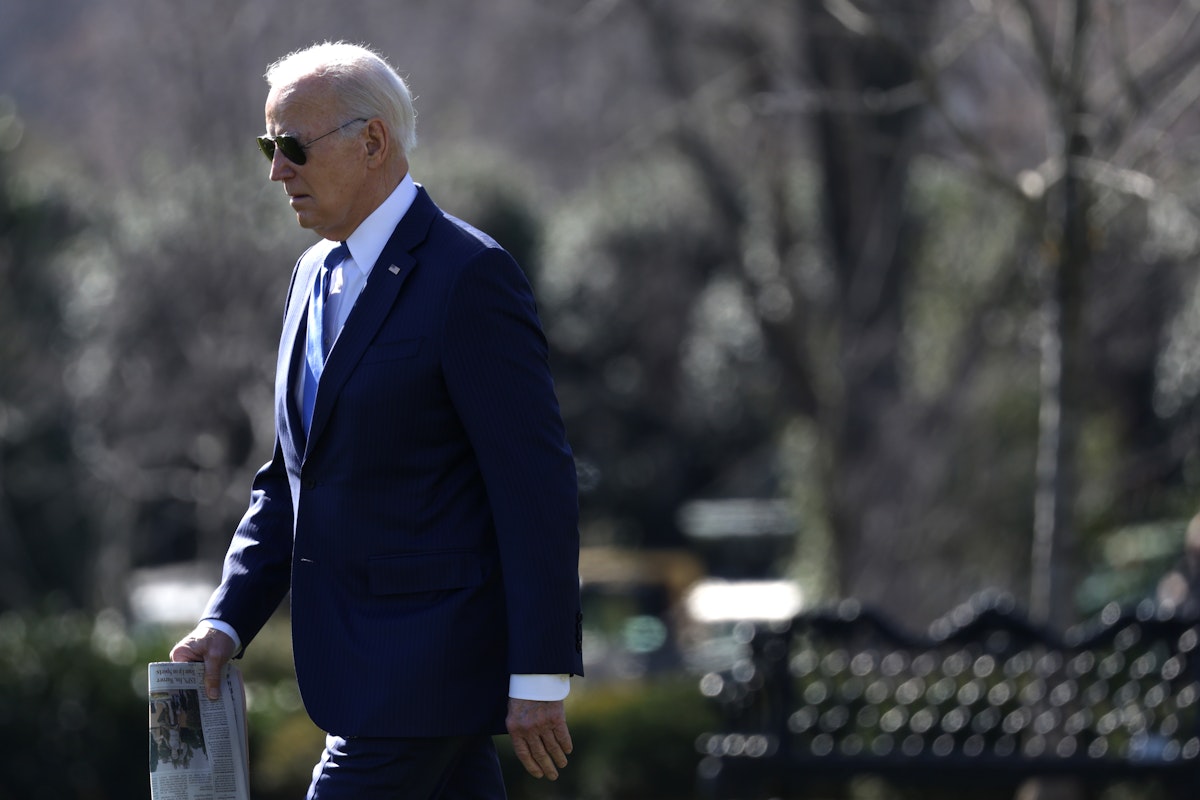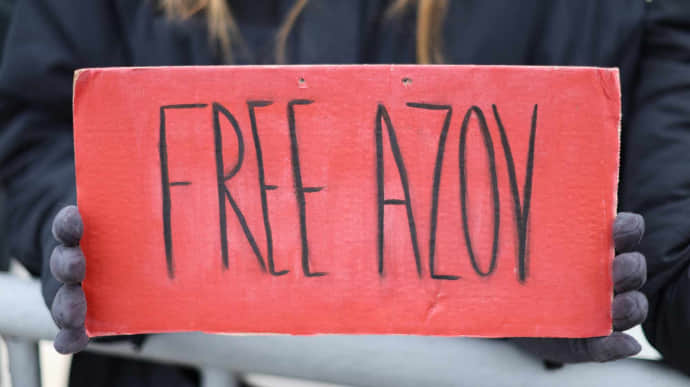Is Joe Biden Uniquely Indifferent to Palestinian Suffering?
Last September, I found myself trying to understand something about President Biden’s behavior that just didn’t make sense to me. Why did it seem like he was bending over backward for Benjamin Netanyahu, even when Biden’s domestic political interests and America’s national interests were not being served by Netanyahu’s decisions?I concluded at the time that the only possible explanation was that Biden was personally being ideologically driven by a commitment to Zionism. All of this was before October 7, and the U.S. support for Israel’s mass killing of Palestinians that followed, somewhere between 25,000 and 30,000 as of this writing, which came with “no red lines.”At the end of last summer, the initial question arose as I watched Washington offer Netanyahu a series of inexplicable gifts. Any semblance of an effort to advance Palestinian self-determination had been tabled indefinitely. The White House was also racing toward a Saudi-Israel normalization deal that could offer Mohammed bin Salman, whom Biden had once promised to make a pariah, an unprecedented defense pact and nuclear technology as a payoff for recognizing Israel. Moreover, the United States was hurrying along Israel’s entry into the coveted U.S. visa-waiver program even as Israel refused to meet the reciprocity criteria required of all Palestinian American citizens. This was something no previous administration, not even Donald Trump’s, was willing to do. This would be peculiar behavior for any American president managing the U.S.-Israel relationship, but what made it more inexplicable was the unique moment in the history of the U.S.-Israel relationship in which it was happening. Netanyahu, who was no friend to Democrats and who sought to undermine the last presidential administration of which Biden was a part, assembled the most far-right government in Israeli history the year prior. Since then, he was tearing the Jewish Israeli electorate, and much of the global Jewish community, apart through his judicial coup efforts. If anything, one might have thought that these conditions would have produced a more adversarial relationship between a Democratic president and a far-right Israeli government in 2023 (there is reportedly, in addition, considerable personal animosity between the two men). But we witnessed the opposite instead. After October 7, I only felt that my suspicions about the administration’s earlier actions were undeniably confirmed. The dangerously dehumanizing tone adopted by President Biden after the Hamas assault on Israel set off alarm bells. I remember turning to my wife after hearing him speak and questioning whether it was safe to send our young Palestinian American children to school the next day. It is only a matter of time before someone gets killed for being Palestinian, I said. A few days later, a 6-year-old Palestinian American child, not much different in age from my kids, was stabbed to death in Chicago. Since then several Palestinian Americans have been targeted in attacks. Another low point came as Biden cast doubt on the very real death toll in Gaza. “I have no notion that the Palestinians are telling the truth about how many people are killed,” said the President of the United States. Not only was this man fully supporting the mass killing of Palestinians by Israel in Gaza and contributing to a deadly climate for his own Palestinian American citizens, he was now also adding to the denialism about any of it even happening. Within two weeks of those comments, a top State Department official was acknowledging before Congress and under oath that the real death toll in Gaza was likely “higher than is being cited.” Israeli media now reports that Israel’s own intelligence agencies consider the Health Ministry death toll reliable and have even relied on it for their own assessments of civilian casualties. The White House has been hearing from groups and individuals representing the Palestinian, Arab, and Muslim American communities for months now about the danger of his callous tone and policy toward Palestinian life, but it doesn’t seem to be registering at all. In the same week that South Africa brought its genocide charge against Israel at the International Court of Justice, the White House released its statement on the 100-day mark since October 7. During this time span, tens of thousands of Palestinians had been killed in one of the most destructive wars in recent memory, yet the White House’s statement doesn’t mention Palestinian victims even once. How can this be? A look at Biden’s history reveals a lot of missed red flags. Biden has often called himself a Zionist and said that if the Israeli state didn’t exist, “we’d have to invent one.” For anyone who understands the devastating consequences for Palestinians tied up in the formation of the Israeli state, namely the ethnic cleansing of hundreds of thousands of Palestinians, hearing such a commitment so casually and repeatedly expressed is jarring and painful.Mo

Last September, I found myself trying to understand something about President Biden’s behavior that just didn’t make sense to me. Why did it seem like he was bending over backward for Benjamin Netanyahu, even when Biden’s domestic political interests and America’s national interests were not being served by Netanyahu’s decisions?
I concluded at the time that the only possible explanation was that Biden was personally being ideologically driven by a commitment to Zionism. All of this was before October 7, and the U.S. support for Israel’s mass killing of Palestinians that followed, somewhere between 25,000 and 30,000 as of this writing, which came with “no red lines.”
At the end of last summer, the initial question arose as I watched Washington offer Netanyahu a series of inexplicable gifts. Any semblance of an effort to advance Palestinian self-determination had been tabled indefinitely. The White House was also racing toward a Saudi-Israel normalization deal that could offer Mohammed bin Salman, whom Biden had once promised to make a pariah, an unprecedented defense pact and nuclear technology as a payoff for recognizing Israel. Moreover, the United States was hurrying along Israel’s entry into the coveted U.S. visa-waiver program even as Israel refused to meet the reciprocity criteria required of all Palestinian American citizens. This was something no previous administration, not even Donald Trump’s, was willing to do.
This would be peculiar behavior for any American president managing the U.S.-Israel relationship, but what made it more inexplicable was the unique moment in the history of the U.S.-Israel relationship in which it was happening. Netanyahu, who was no friend to Democrats and who sought to undermine the last presidential administration of which Biden was a part, assembled the most far-right government in Israeli history the year prior. Since then, he was tearing the Jewish Israeli electorate, and much of the global Jewish community, apart through his judicial coup efforts. If anything, one might have thought that these conditions would have produced a more adversarial relationship between a Democratic president and a far-right Israeli government in 2023 (there is reportedly, in addition, considerable personal animosity between the two men). But we witnessed the opposite instead.
After October 7, I only felt that my suspicions about the administration’s earlier actions were undeniably confirmed. The dangerously dehumanizing tone adopted by President Biden after the Hamas assault on Israel set off alarm bells. I remember turning to my wife after hearing him speak and questioning whether it was safe to send our young Palestinian American children to school the next day. It is only a matter of time before someone gets killed for being Palestinian, I said. A few days later, a 6-year-old Palestinian American child, not much different in age from my kids, was stabbed to death in Chicago. Since then several Palestinian Americans have been targeted in attacks.
Another low point came as Biden cast doubt on the very real death toll in Gaza. “I have no notion that the Palestinians are telling the truth about how many people are killed,” said the President of the United States. Not only was this man fully supporting the mass killing of Palestinians by Israel in Gaza and contributing to a deadly climate for his own Palestinian American citizens, he was now also adding to the denialism about any of it even happening. Within two weeks of those comments, a top State Department official was acknowledging before Congress and under oath that the real death toll in Gaza was likely “higher than is being cited.” Israeli media now reports that Israel’s own intelligence agencies consider the Health Ministry death toll reliable and have even relied on it for their own assessments of civilian casualties.
The White House has been hearing from groups and individuals representing the Palestinian, Arab, and Muslim American communities for months now about the danger of his callous tone and policy toward Palestinian life, but it doesn’t seem to be registering at all. In the same week that South Africa brought its genocide charge against Israel at the International Court of Justice, the White House released its statement on the 100-day mark since October 7. During this time span, tens of thousands of Palestinians had been killed in one of the most destructive wars in recent memory, yet the White House’s statement doesn’t mention Palestinian victims even once.
How can this be? A look at Biden’s history reveals a lot of missed red flags. Biden has often called himself a Zionist and said that if the Israeli state didn’t exist, “we’d have to invent one.” For anyone who understands the devastating consequences for Palestinians tied up in the formation of the Israeli state, namely the ethnic cleansing of hundreds of thousands of Palestinians, hearing such a commitment so casually and repeatedly expressed is jarring and painful.
More striking is an anecdote from a moment similar to the current one, in the early 1980s. Israel’s bombing of Beirut, framed by Israel as self-defense, was condemned for its brutality around the world. Even President Ronald Reagan told off the Israelis at the time, telling Israeli Prime Minister Menachem Begin he was perpetrating a “holocaust” and that the bombing had to end. When Begin visited D.C. that year, he received pushback from senators over Israel’s conduct and killings of civilians.
One young senator, Begin recalled, stood out in contrast for his unreserved support for Israel’s military strikes even if it meant killing women and children. That was Senator Joseph R. Biden of Delaware. Begin was so shocked he had to disassociate himself from Biden’s remarks. A few months later, Israeli military–backed militias would carry out the gruesome Sabra and Shatila massacre in Beirut.
Let that sink in for a moment: Biden then was not only to the right of Ronald Reagan when it came to protecting Palestinian life, he was to the right of Menachem Begin. Today, he still is.
The Biden administration has claimed repeatedly that it is working to reduce civilian casualties, increase humanitarian aid, and press the Israelis to conduct the war in a less indiscriminate way. That may be, but the numbers speak for themselves, and while the administration is sending one message from its podiums, it has repeatedly circumvented Congress to expedite weapons shipments to Israel. The real message has been: no red lines.
In addition, many people have noticed the sharp difference in tone and passion when Biden talks about Israelis versus Palestinians. Shibley Telhami of the University of Maryland told The Washington Post in December: “The president, different from his graphic description of Hamas’s horrific attack on Israel and Israeli victims … has rarely talked about the Palestinian children torn to pieces, or the hundreds of thousands of people without water or food. He talks about [Palestinians] as if they’re victims of an earthquake or natural disaster, without tying them to the actions of the Israeli government with his support and backing.”
When I have made the point that Biden is likely the most anti-Palestinian person to occupy the Oval Office in recent history, many are quick to ask how different Trump’s handling of the current moment would be. Would he be any less supportive of Israel? Probably not, though that doesn’t exactly reflect well on Biden. Trump was callous toward all sorts of people, and Palestinians were not excluded from this. What sets Biden’s particular animus against Palestinians apart is that he was supposed to be different. The so-called “empath in chief” was supposed to be the polar opposite of Trump, yet he seems capable of showing empathy toward all people except Palestinians and precisely at a time of their greatest pain and suffering.
The region is taking notice too. New polling of attitudes in the Arab world, conducted by Arab Center Washington DC and the Arab Center for Research and Policy Studies, show that the U.S. is seen as more of a threat than Israel and to a greater extent than in years prior. Overwhelming majorities of respondents view the U.S. handling of the war negatively. Respondents also see the U.S. as the primary reason why the horrific Israeli war on Gaza continues.
The commitment to Israel’s atrocities is also having an impact on Biden’s election chances. Key demographics that he needs for reelection are opposed to his handling of the war. The recipe for Biden’s victory in 2020 was not only winning the key demographics that made up his electoral coalition but also getting them to turn out in large numbers. That looks like a more impossible task with every hospital that is bombed, every journalist who is killed, and every child who has a limb amputated without anesthetics in Gaza.
The president wants to make the case that American democracy is on the line in November and its survival has implications at home and abroad. Will it survive or be added to the death toll in the war on Gaza? It might turn out to be the first casualty of the Gaza war he genuinely regrets. At that point, though, it will be too late. For tens of thousands of Palestinians, it already is.



